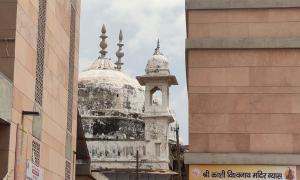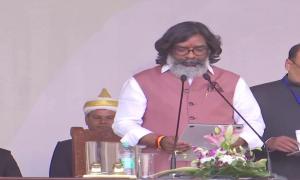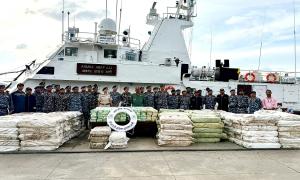Former prime minister Benazir Bhutto's second home coming after eight years of self-imposed exile has come amid a political crisis in Pakistan.
Following is a brief chronology of the major developments in Bhutto's political life:
April 4, 1979: Benazir Bhutto's father, former prime minister Zulfikar Ali Bhutto, is executed by military dictator Zia-ul-Haq. Bhutto allowed to leave for England in 1984 after three-years of imprisonment.
April 1986: Bhutto arrives in Lahore from exile to a rapturous welcome by millions of supporters to lead the Pakistan People's Party against Zia-ul-Haq.
November 16, 1988: Zia-ul-Haq killed in an air crash. The PPP wins in the ensuing general elections
December 2, 1988: Bhutto sworn in as Pakistan's first woman prime minister.
August 1990: Bhutto dismissed by president Ghulam Ishaq Khan on charges of corruption and misrule. Her husband Asif Zardari arrested on kidnapping charges.
October 1990: PPP loses in the general elections and sits in Opposition for three years while Nawaz Sharif becomes prime minister.
October 1993: PPP returns to power and Bhutto is re-elected prime minister for a second term.
October 1996: President Farooq Ahmed Leghari sacks Bhutto on charges of corruption and abuse of power. Zardari arrested once again and imprisoned on a range of corruption and criminal charges.
April 1999: A Pakistani court convicts Bhutto and Zardari of receiving kickbacks worth millions of dollars for awarding a contract to two Swiss firms during her 1993-96 rule. The conviction is overturned two years later.
April 1999: Bhutto goes into self-imposed exile in London and Dubai, vowing to return to Pakistan and contest elections in 2002.
October 12, 1999: Army chief Musharraf overthrows prime minister Nawaz Sharif in a coup after Sharif tries to sack him.
July 2002: Musharraf issues a decree barring former premiers who have served two terms from serving a third, widely viewed as targeting Bhutto and Sharif.
October 10, 2002: Nationwide polls are held without Bhutto who is warned that she will be jailed if she returns. The PPP wins 80 of the 342 National Assembly seats.
July 2003: A Swiss court finds Bhutto and Zardari guilty of laundering US $12 million through Swiss bank accounts and hands them a six-month suspended jail term. The sentence is later overturned on appeal.
November 2004: Zardari is released from prison after serving eight years on corruption charges and reunites with Bhutto in exile.
January 2006: Interpol issues international notices following a request by Pakistan for the arrest of Bhutto and Zardari on corruption charges.
July 3-10, 2007: Pakistani troops besiege and storm the radical Red Mosque in Islamabad, killing at least 100 people.
July 13, 2007: Bhutto praises the operation, sparking outrage among hardliners. A suicide bomber later attacks her party headquarters, killing 15 people.
September 2007: Musharraf and Bhutto aides step up talks in London and Dubai over a power-sharing pact.
September 14, 2007: PPP announces that Bhutto will return on October 18.
October 4, 2007:Bhutto and Musharraf agree on a national reconciliation accord. Musharraf signs deal for an amnesty which clears Bhutto of graft charges.
October 6, 2007: Musharraf wins presidential election.
October 13: The government urges Bhutto to delay her return until a court rules whether the amnesty deal is legal.
October 17, 2007: At a press conference in Dubai, Bhutto confirms she will return as planned, saying "Pakistan's future is at stake."








More from rediff